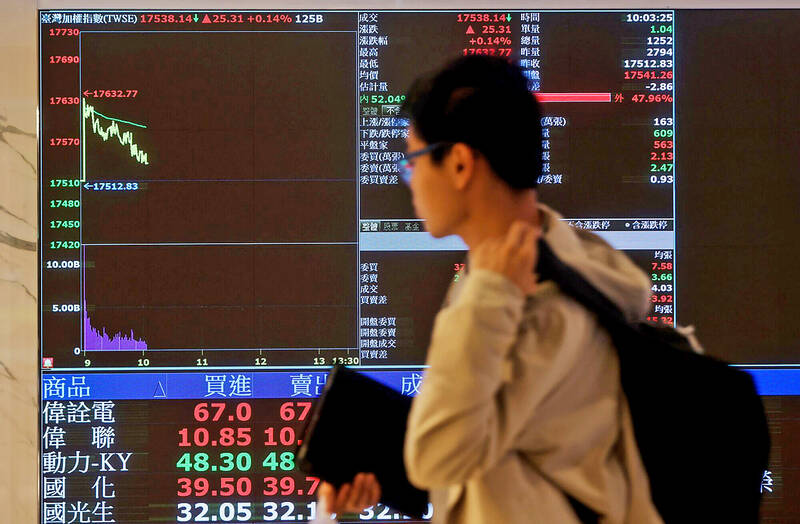Fewer retail investors entered the local stock market in the fourth quarter of last year, while more institutional investors, foreign and domestic, pushed ahead after technical consolidation in the market ended, data compiled by the Taiwan Stock Exchange (TWSE) showed on Monday.
During the October-to-December quarter, retail investors accounted for 55.96 percent of the local market’s turnover, down from 59.01 percent in the previous quarter, the exchange said in a statement.
In contrast, foreign institutional investors made up 32.74 percent of the exchange’s turnover, up 1.97 percentage points from the previous quarter, while domestic institutional investors represented the remaining 11.3 percent, up 1.08 percentage points, the TWSE said.

Photo: Bloomberg
Although market sentiment improved after November, and the TAIEX rose 1,577.07 points in the final quarter of last year, retail investors favored safer investment approaches, with dollar-cost averaging investments gaining NT$442 million (US$14.1 million) to NT$9.78 billion last month from the previous month, the exchange’s data showed.
Dollar-cost averaging is the practice of investing a fixed-dollar amount on a regular basis, regardless of the share price. It has become more popular among retail investors investing in high-dividend exchange-traded funds or local stocks with stable dividends, the exchange said.
Among retail investors, 2,973 “big players” participated in the local market in the fourth quarter, down 523 from a seven-quarter high of 3,496 in the previous quarter, TWSE data showed.
A “big player” is defined as an investor who trades at least NT$500 million in shares on the TWSE in a single quarter.
The number of “midsized players” — or retail investors with quarterly turnover of between NT$100 million and NT$500 million — decreased to 23,604 last quarter from 28,597 the previous quarter, while that of “small players,” with quarterly trading of less than NT$100 million, also fell to 4.34 million from 4.51 million, the data showed.
The exchange’s latest data are seen as an important indicator of investor confidence in Taiwanese equities, after the TAIEX’s robust performance last year, with a full-year gain of 3,793 points, or 26.7 percent.
The TAIEX yesterday closed down 199.95 points, or 1.14 percent, in line with other regional indices as concerns about geopolitical risks and Taiwan’s new political landscape after Saturday’s elections overshadowed hopes for an early US Federal Reserve interest rate cut, Capital Investment Management Corp (群益投顧) said in a note yesterday.
The index has dropped 2.14 percent so far this year.

Semiconductor business between Taiwan and the US is a “win-win” model for both sides given the high level of complementarity, the government said yesterday responding to tariff threats from US President Donald Trump. Home to the world’s largest contract chipmaker, Taiwan Semiconductor Manufacturing Co (TSMC, 台積電), Taiwan is a key link in the global technology supply chain for companies such as Apple Inc and Nvidia Corp. Trump said on Monday he plans to impose tariffs on imported chips, pharmaceuticals and steel in an effort to get the producers to make them in the US. “Taiwan and the US semiconductor and other technology industries

SMALL AND EFFICIENT: The Chinese AI app’s initial success has spurred worries in the US that its tech giants’ massive AI spending needs re-evaluation, a market strategist said Chinese artificial intelligence (AI) start-up DeepSeek’s (深度求索) eponymous AI assistant rocketed to the top of Apple Inc’s iPhone download charts, stirring doubts in Silicon Valley about the strength of the US’ technological dominance. The app’s underlying AI model is widely seen as competitive with OpenAI and Meta Platforms Inc’s latest. Its claim that it cost much less to train and develop triggered share moves across Asia’s supply chain. Chinese tech firms linked to DeepSeek, such as Iflytek Co (科大訊飛), surged yesterday, while chipmaking tool makers like Advantest Corp slumped on the potential threat to demand for Nvidia Corp’s AI accelerators. US stock

The US Federal Reserve is expected to announce a pause in rate cuts on Wednesday, as policymakers look to continue tackling inflation under close and vocal scrutiny from US President Donald Trump. The Fed cut its key lending rate by a full percentage point in the final four months of last year and indicated it would move more cautiously going forward amid an uptick in inflation away from its long-term target of 2 percent. “I think they will do nothing, and I think they should do nothing,” Federal Reserve Bank of St Louis former president Jim Bullard said. “I think the

Cryptocurrencies gave a lukewarm reception to US President Donald Trump’s first policy moves on digital assets, notching small gains after he commissioned a report on regulation and a crypto reserve. Bitcoin has been broadly steady since Trump took office on Monday and was trading at about US$105,000 yesterday as some of the euphoria around a hoped-for revolution in cryptocurrency regulation ebbed. Smaller cryptocurrency ether has likewise had a fairly steady week, although was up 5 percent in the Asia day to US$3,420. Bitcoin had been one of the most spectacular “Trump trades” in financial markets, gaining 50 percent to break above US$100,000 and